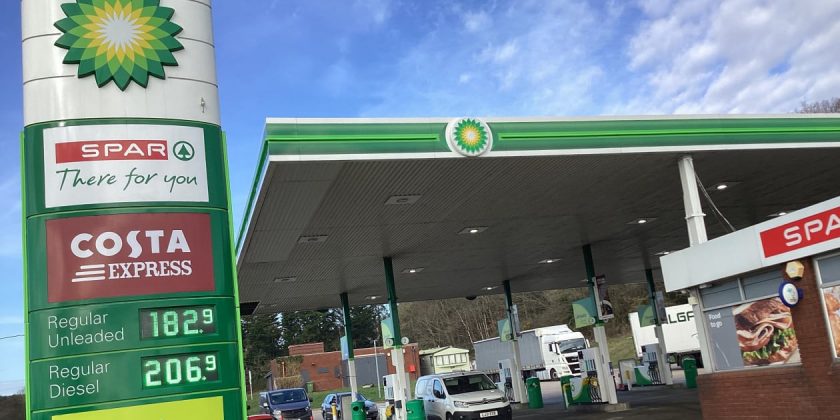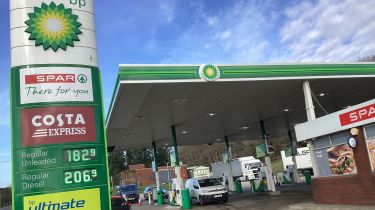Petrol is now 2.8p per litre lower than its record high, with possibility for average tank to soon be £10 cheaper
Mike Rutherford
UK petrol and diesel prices are beginning to ease, currently at an average of 188.76p a litre for the former and 196.96p a litre for the latter.
Meanwhile, wholesale petrol that had peaked above £1 a litre on 1 June, fell to below 80p a litre for much of last week, indicating as much as a 20p fall from record highs at the pump within a fortnight.
How to find the cheapest petrol and diesel near you
The decrease may continue, according to the AA, due to wholesale costs having fallen from £1 to 80p. This could mean a 20p reduction in petrol prices at the pumps, so long as retailers pass their savings on.
“Wholesale petrol’s trajectory, if sustained, would lead to savings of a tenner off a tank from the record highs – providing the fuel trade is prepared to pass them on,” said AA fuel price spokesman Luke Bosdet. “Even with oil rebounding, wholesale petrol remains below 80.5p a litre.
“The problem is that, in many places, the price cuts are quite simply not happening despite more than six weeks of falling costs.”
The saving may only be temporary, though, with David Wech – chief economist at energy analytics firm Vortexa – having told Auto Express that “the supply of Russian oil hasn’t really been a factor in prices yet”.
Refining capacity limitations and a lack of inventory of refined fuel are key problems as well, Wech says. That, combined with the full impact of the Russia situation, will mean crude oil barrel prices will be anywhere between $100 and $200 in the next 12 months.
Watchdog: fuel retailers did pass on tax cut
Fuel retailers have been investigated after accusations that the 5p-per-litre fuel duty cut was pocketed instead of being passed on to consumers. Business secretary Kwasi Kwarteng wrote to the boss of the Competition and Markets Authority (CMA), asking for an independent review and the review has now reported that the tax cut was indeed reflected in petrol and diesel prices.
The CMA report did raise concerns over the growing gap between the price of crude oil and the wholesale price of petrol and diesel fuel. Oil industry experts have suggested that this is due to limited refining capacity and low refined fuel inventories, identifying these as the main drivers of the fuel price crisis facing the UK.
Why are diesel and petrol so expensive?
Russia is one of the world’s largest producers of oil and gas, so any disruptions to its production processes has a global impact.
With Russia having launched a full-scale invasion of Ukraine and facing international sanctions, there’s potential for significant disruption to supplies. Russia produces 4.5 million barrels of oil each day, and only Saudi Arabia produces more.
E10 petrol explained: checker tool, UK prices and is it OK for your car?
The sanctions levied against Russia so far have targeted banks and oligarchs rather than the country’s energy sector, but factors such as Germany’s postponement of the Nord Stream 2 gas pipeline will have an effect on the energy market overall. Russia also has the ability to reduce oil exports to Europe in a tit-for-tat response to economic sanctions, and experts suggest Saudi Arabian oil fields could struggle to increase production sufficiently to counter such measures.
“Opec, the oil producers’ cartel, is already struggling to meet its output targets as demand for crude rebounds following the easing of lockdown restrictions. This has pushed up prices, with analysts warning there is limited capacity to increase supplies if flows from Russia are affected by sanctions,” the Financial Times newspaper has reported.
What makes up the price of UK fuel?
The price of fuel can be divided into three sections; the taxes imposed by the Government, the costs of drilling, refining and transporting, and the profit margins for the fuel companies.
For petrol, diesel and bioethanols, the Government gets around 65 per cent of the overall cost through fuel duty and value added tax (VAT). The fuel duty represents the fixed price of fuel – it stays the same regardless how much overall oil prices fluctuate. Currently, the Treasury adds 57.95 pence to each litre of fuel through fuel duty, and another 20 per cent through VAT. How much you pay in VAT depends on how much fuel you purchase.
The second biggest chunk comes from the wholesale costs of the fuel itself. The wholesale cost is a combination of currency exchange rates, global oil prices, and even domestic supply and demand.
When will fuel prices go down?
Experts predict high fuel costs will be with us for the foreseeable future, and it’s not just down to the crisis in Ukraine – energy costs have been high for the best part of a year already as demand surged as the world emerged from lockdown.
Part of the problem is down to the fact that relatively low barrel prices in recent years have put plans to drill for new reserves on hold. That’s true in Africa, the US and South America, and while the current high prices may increase interest in exploring new reserves, it can take years for new wells to come on stream in volumes required to affect the market.
Why is supermarket fuel cheaper than an independent forecourt?
Supermarket forecourts usually offer the cheapest fuel prices and this is because of the market power supermarkets hold. Companies like Asda, Tesco, Sainsbury’s and Morrisons are all in competition with one another, so they keep fuel prices as low as possible hoping that when motorists come to fill their tank, they might do their weekly grocery shopping, too.
There are persistent rumours that supermarket fuel contains fewer additives and is of lesser quality than fuel from traditional forecourts, but there’s little hard evidence of this. All fuel sold in the UK has to abide by the standards set in the Motor Fuel Regulation.
Why is fuel so expensive on motorways?
Motorway fuel stations argue the reason their prices are higher is that many of them are open 24 hours a day and offer more services than a regular forecourt. Motorway fuel stations also pay high rent prices for the buildings they operate.
What is hypermiling and how do you do it?
In more remote areas, fuel is often more expensive because of the higher transport and supply costs, but according to RAC fuel spokesman Simon Williams, this doesn’t apply to motorway stations: “We can see no reason why motorway fuel should be so much more expensive. In fact, arguably it is much easier from a delivery point of view than it is getting fuel to urban filling stations.”
Why is diesel more expensive than petrol?
Although diesel and petrol are taxed the same by the Treasury, historically diesel has been more expensive than petrol, as domestic refineries have struggled to meet demand. This has forced the UK to import diesel from other countries at a greater rate than petrol. In addition, diesel prices are pushed up by the cost of the additives that go into the fuel.
Furthermore, the gap between UK petrol and diesel prices widens during the winter. The end of the US “driving season” means retailers have a surplus of petrol they can’t export, so they sell it here at a lower price. Diesel demand, meanwhile, increases across continental Europe, where the fuel is commonly used in heating oil.
Recently, the influx of cheap diesel from countries like Saudi Arabia has turned the tide, swinging diesel wholesale prices closer to that of petrol, and bringing the pump price down with it. However the fact that we get a higher percentage of diesel from Russia than petrol means the advantage has swung the other way again.
What’s your view on fuel prices in the UK? Do we pay too much for our petrol and diesel? What would you do about it? Join the debate in our comments section below…
Source: Read Full Article



 How to find the cheapest petrol and diesel near you
How to find the cheapest petrol and diesel near you
 E10 petrol explained: checker tool, UK prices and is it OK for your car?
E10 petrol explained: checker tool, UK prices and is it OK for your car? What is hypermiling and how do you do it?
What is hypermiling and how do you do it?